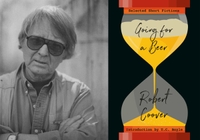Ghost Town
Robert Coover, Couver. Henry Holt & Company, $24 (256pp) ISBN 978-0-8050-5884-0
A nameless drifter rides into a ghost town from a desolate wilderness. His horse wanders off. Hearing noises in the saloon, he enters to find a crew playing poker, a humpback at the piano and a red-haired chanteuse pitching a doleful melody. These pop tropes, culled from westerns and dirty jokes, are trademark Coover material. As you'd expect, things rapidly shift--the humpback becomes a deputy, the drifter a sheriff, the poker-playing crew now a posse, now a lynch mob. As in A Night at the Movies, persons and places are variables in an equation and have a tendency to rapidly shuck identities, while their relationships, ossified in the cliches where Coover found them, remain constant. The chanteuse and the schoolmarm seem to be the only characters who are anchored in the real world, but don't bet on it. This novel is written in the Davy Crockett English Coover employed with devastating wit in The Public Burning (""Us proper ladies jest ain't habituated t'sechlike incivil misabuse,"" ""I tole him he wuz a rat for stealin thet hoss,"" etc.), but here the jokiness is forced, and the language never takes off. Coover's career is divided between the genius who wrote The Public Burning and most of Gerald's Party and the smarty-pants who wrote Spanking the Maid and parts of Pinocchio in Venice. The smarty-pants knows all too much about literary theory but can't distinguish between a sneer and a laugh. The genius, on the other hand, like a lyrical W.C. Fields, taps into the rudiments of liberation submerged in the lamest practical joke. Sad to say, the smarty-pants runs this town. (Sept.)
Details
Reviewed on: 08/31/1998
Genre: Fiction
Open Ebook - 175 pages - 978-1-941088-83-8
Other - 160 pages - 978-1-4532-9663-9
Paperback - 160 pages - 978-0-8021-3666-4


